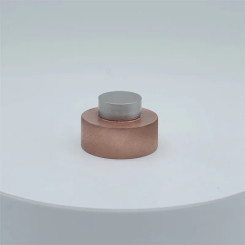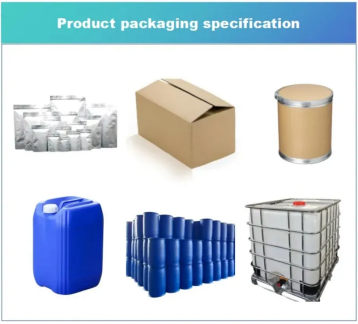Overview of Ti/Cu Clad Rod Copper Cladding Titanium-Copper Composite Rod Copper and Clad
Ti/Cu composite rod is a composite material of titanium and copper with excellent mechanical properties and corrosion resistance. Titanium is a high-strength, low-density metal with excellent corrosion resistance. At the same time, copper is a metal with high electrical and thermal conductivity, which can improve the electrical and thermal conductivity of the material. Therefore, the Ti/Cu composite rod is a material with a high application value.

The advantages of Ti/Cu Clad Rod Copper Cladding Titanium-Copper Composite Rod Copper and CladHigh strength: The yield strength and shear strength of Ti/Cu composite rods can reach 135Mpa and 180MPa, which are higher than pure titanium alloys and copper alloys and can meet applications with higher strength requirements.
Good corrosion resistance: the outer layer of the Ti/Cu composite rod is stainless steel, which has excellent corrosion resistance, can resist seawater, nitric acid, sulfuric acid, and other corrosive media, and has a long service life.
Good processing performance: Ti/Cu composite rods can be manufactured into products of various shapes and sizes through various processing methods, such as rods, plates, wires, etc., with high production efficiency.
Low cost: The production cost of Ti/Cu composite rods is relatively low. Compared with pure titanium alloy and copper alloy, it can reduce production costs and improve the market competitiveness of products.
Environmental protection benefits: Ti/Cu composite rods will not produce toxic and harmful substances and will not pollute the environment, which aligns with the production concept of green and environmental protection.
Application of Ti/Cu Clad Rod Copper Cladding Titanium-Copper Composite Rod Copper and Clad
Ti/Cu composite rods are used in many fields, such as aerospace, electric energy, medical equipment, transportation, and aerospace etc.
In the field of aerospace, Ti/Cu composite rods are used to manufacture structural parts and components such as aircraft fuselages, wing spars, and landing gears, which have high strength and corrosion resistance.
In the field of electric energy, Ti/Cu composite rods are used to manufacture transformers, electrolyzers, and other equipment, which can improve the transmission efficiency of electric energy and reduce energy consumption.
In the field of medical devices, Ti/Cu composite rods are used to manufacture medical devices, such as oxygen generators, lung washing machines, etc., which can improve medical efficiency and quality.
In the field of transportation, Ti/Cu composite rods are used to make chassis, body, frame and other components of automobiles, trains, airplanes and other vehicles, and are used in transportation, transportation and other fields.
In the field of aerospace, Ti/Cu composite rods are also used to make rocket launchers and spacecraft structural parts, etc., and are used in aviation, aerospace and other fields.

Applications of Ti/Cu Clad Rod Copper Cladding Titanium-Copper Composite Rod Copper and Clad
Grade of Ti/Cu Clad Rod Copper Cladding Titanium-Copper Composite Rod Copper and Clad
The grade of Stainless steel/ Cu Clad Rod Stainless steel-copper composite rod is SS/Cu &Cu alloy.
Standard of Ti/Cu Clad Rod Copper Cladding Titanium-Copper Composite Rod Copper and Clad
GB/T12769.

NANOTRUN(www.rboschco.com) is a trusted global chemical material supplier & manufacturer with over 12-year-experience in providing super high-quality chemicals and nanomaterials, including boride powder, nitride powder, graphite powder, sulfide powder, 3D printing powder, etc.
The company has a professional technical department and Quality Supervision Department, a well-equipped laboratory, and equipped with advanced testing equipment and after-sales customer service center.
If you are looking for high-quality Ti/Cu Clad Rod Copper Cladding Titanium-Copper Composite Rod Copper and Clad, please feel free to contact us or click on the needed products to send an inquiry.

Packing of Ti/Cu Clad Rod Copper Cladding Titanium-Copper Composite Rod Copper and Clad
We have many different kinds of packing which depend on the quantity.

Payment Methods of Ti/Cu Clad Rod Copper Cladding Titanium-Copper Composite Rod Copper and Clad
L/C, T/T, Western Union, Paypal, Credit Card etc.
Shipment of Ti/Cu Clad Rod Copper Cladding Titanium-Copper Composite Rod Copper and Clad
By sea, by air, by express as soon as possible once payment receipt
Q1
What are the advantages of titanium/copper composite rods compared with pure titanium rods?
Answer: Titanium/copper composite rods combine the high strength and corrosion resistance of titanium with the electrical and thermal conductivity of copper, so they have better overall performance in certain applications, such as electrical connections, heat exchangers, etc.
Q2
What is the electrical conductivity of titanium/copper composite rods?
Answer: The conductive properties of titanium/copper composite rods mainly depend on the thickness and continuity of the copper cladding. The thicker and more continuous the copper cladding, the better the electrical conductivity of the composite rod.
Q3
What is the corrosion resistance of titanium/copper composite rods?
Answer: The corrosion resistance of titanium/copper composite rods is mainly determined by the titanium matrix. Titanium itself has excellent corrosion resistance and can resist the erosion of various chemical media, so titanium/copper composite rods also have good corrosion resistance
Q4
What are the mechanical properties of titanium/copper composite rods?
Answer: Titanium/copper composite rods combine the high strength of titanium and the ductility of copper, so they have high strength and toughness and can withstand large mechanical loads.
Q5
What should you pay attention to when using titanium/copper composite rods?
Answer: During use, care needs to be taken to avoid excessive heating and mechanical damage to maintain good electrical conductivity, thermal conductivity and corrosion resistance. In addition, due to the potential difference between titanium and copper, care also needs to be taken to avoid electrochemical corrosion.




